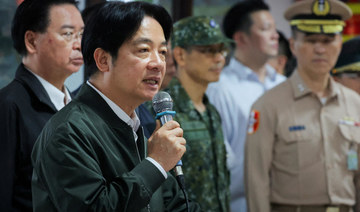CHICAGO: Despite an apparent surge in anti-Arab and Islamophobic sentiments in the US driven by the war in Gaza, Americans live in an environment heavily influenced by the innovations of Arabs, Muslims and Palestinians.
Indeed, Arab-American inventions in everything from food and drink to medicine and technology have dramatically improved the American lifestyle. And yet the community seldom gets the recognition it is due.
One striking example involves the work of Palestinian-American graphic designer Rajie Suleiman, professionally known as Roger Cook, who died in February 2021 at the age of 90 having left a profound legacy.

Rajie Suleiman, also known as Roger Cook. (Supplied)
Cook was a graphic designer who created the ubiquitous “pictograms” that ease the everyday lives of Americans across industries, professions, transport, amenities, and public safety.
Among them are the icons of a man and a woman used to identify public restrooms, symbols for non-smoking areas, public telephones, emergency medical services, parking, no entry signs, and for public transportation including airports and transit stops.
Because they are so ubiquitous, the pictograms Cook designed are often overlooked, yet they serve as efficient identifiers in nearly every aspect of American life — concise graphic depictions that convey meaning across languages, cultures and levels of literacy.
Cook and his business partner Don Shanosky won a government contract in 1974 to design a series of pictograms of small, easily identifiable images that could efficiently inform and direct the public to the services they require.

Roger Cook's works are memorialized in a display at the Arab American National Museum in Dearborn, Michigan. (Supplied)
The Manhattan-based graphic designers created 34 pictograms that conveyed meaning through their resemblance to physical objects, according to Cook’s obituary in the New York Times.
These images are especially helpful in airports and other environments where people may not be familiar with the local language. Indeed, they have become known as a “universal language of wayfinding.”
Beyond municipal spaces, pictograms have been adopted by IBM, Container Corporation of America, Montgomery Ward, Bristol Myers Squibb, Volvo, Subaru, AT&T, the New York Times, Bell Atlantic and BASF, among other major companies.
For their “outstanding achievement in design for the government of the United States,” Cook and Shanosky received an award from then President Ronald Reagan.

Roger Cook (right) accepts an award from President Ronald Reagan on Jan. 30, 1985, as Elizabeth Dole, the Secretary of Transportation, looks on. (Courtesy of the family)
“We held firm to the principle that design communicates to its maximum efficacy without frills, contrivances and other extraneous material that if the core idea is a good one, it will shout loudest when it is not overshadowed by ornamentation,” Cook wrote in his 2017 book, “A vision for my father.”
Somewhat ironically, the designer himself underwent a process of cross-cultural simplification when his name was changed from Rajie Suleiman to the anglicized moniker Roger Cook.
Cook’s paternal grandfather’s surname was Suleiman. However, according to Cook’s obituary, his grandfather “was given the nickname Kucuk, the Turkish word for small, by Turkish occupiers because of his small stature.
“Later, when the British occupied Palestine, they turned that into Cook.”
Many years later, his grandson also had a new name foisted upon him. Rajie’s elementary school teachers found his name too difficult to pronounce, and so chose to Americanize it to Roger. Thus, Rajie Suleiman became Roger Cook.

Roger Cook's sculptures featured items he had collected at flea markets and elsewhere.
(Courtesy of the family)
Despite this imposed identity, Cook and his family never lost sight of their Arab-Palestinian heritage. Cook told the New York Times in a 2004 interview that his own father had died at the age of 94 while listening to the radio in the hope of hearing news of peace in Palestine.
His father’s passion for Palestine and the many family trips they made to the region during Cook’s childhood later inspired him to expand his graphic representations, creating images that reflected the tragedy of the Nakba, or catastrophe, of 1948.
Many of his photos, paintings, and graphics are publicly displayed at the Palestine Museum in Woodbridge, Connecticut, and are currently memorialized in a display at the Arab American National Museum in Dearborn, Michigan.
“His Symbol Signs’ graphic design work was created in collaboration with his business partner Don Shanosky for the Department of Transportation to standardize way-finding symbols used in public spaces,” Elizabeth Barrett Sullivan, the museum’s collections curator, told Arab News.
“While they didn’t invent pictographs as a mechanism, they were the firm chosen to create this system that has been widely used and replicated.
“As graphic designers, they understood the need for signs that could be recognized without the need for text. The majority of the symbols created in the ‘70s are still in use today, which is a testament to their universality.”

All Flights Cancelled, sculptural assemblage, 2006 by Rajie Cook. (Supplied)
Sullivan said the items in the museum display were donated by Cook’s family two years ago. The display will be a “semi-temporary” exhibit, with plans for it to travel to other institutions in the years ahead.
“We are excited to have his work in our collections and be able to share his story with our visitors,” said Sullivan.
“He was a prolific artist, especially in the last 20 years of his life, with a significant focus on Palestine. He used his art to bring more awareness to the cruelty of the occupation, as well as honoring his own heritage.”
Of course, Arab-Americans have contributed far more than mere signage. Many iconic brands were started as small businesses run by Arab-Americans, among them Haggar, Philz Coffee, Kinko’s, BioSilk hair products, and Joy Ice Cream Cones, to name but a few.
The development of television transmission and liquid-crystal display screens was spearheaded by Lebanese-American Hassan Kamel Al-Sabbagh for General Electric.

Other Arab Americans who have dramatically improved global lifestyle include pop-top tab designer Nick Khoury; coronary bypass surgery pioneer Dr. Michael DeBakey; TV technology developer Hassan Kamel Al-Sabbagh; and iPod and iPhone design leader Tony Fadell. (Getty Images/ Supplied)
In medicine, surgical techniques in heart surgery were pioneered by Dr. Michael DeBakey, the son of Lebanese immigrants, who developed coronary bypass surgery in 1963 that has saved millions of lives.
The popular waffle ice cream cone is claimed by no fewer than four Arab-Americans — Ernest Hamwi, Nick Kabbaz, Abe Doumar and Leon B. Holwey.
Working at Apple Computers under Steve Jobs, himself an Arab-American orphan adopted as a baby, fellow Arab-American Tony Fadell oversaw the 2001 design of the iPod and the iPhone.
And Nick Khoury, a Palestinian-American born in Jifna, led the team at the Continental Can Company in the 1950s that designed and developed the pop top tab that allowed Americans to shift from glass bottled drinks to easy-open aluminum cans.
At a time when conflict is raging in the Middle East, stoking fear, anger and mistrust among communities across the globe, it is easy to forget the many positive contributions made by those who trace their origins to the region.
By acknowledging the many ways in which Arab-Americans like Rajie Suleiman have bettered public life, perhaps a recognition of common humanity will prevail, offering a potential way-finder to peace.




























